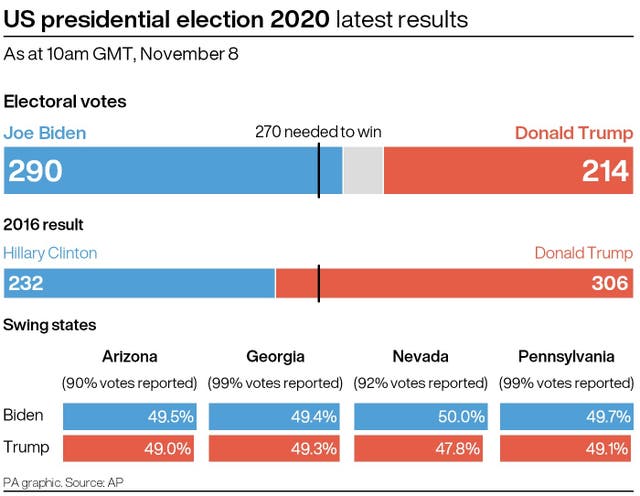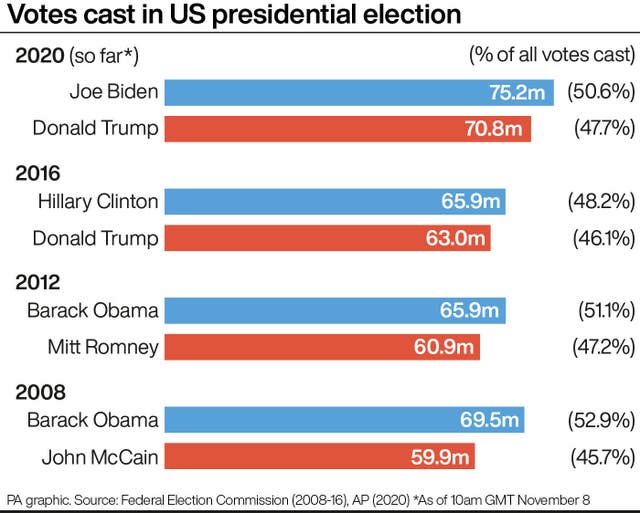
Ian Payne 4am - 7am
8 November 2020, 18:24

The president-elect’s calls for reconciliation came even as president Donald Trump continued to argue that the election had been stolen from him.
Joe Biden used his first national address as president-elect to vow to heal a deeply divided nation, declaring it was time to “let this grim era of demonisation in America begin to end”.
He also reached out to the millions of people who voted against him, saying: “Let’s give each other a chance.”
His calls for reconciliation at a Saturday evening victory celebration came even as president Donald Trump continued to argue that the election had been stolen from him, an indication that the divisive politics that have gripped the US over the past four years are far from over.

It also suggested that even as Mr Biden seeks to build out a government during his transition to the presidency, the president has little interest in helping him do so.
“For all those of you who voted for President Trump, I understand the disappointment,” Mr Biden said during a drive-in event in Wilmington, Delaware.
“It’s time to put away the harsh rhetoric, lower the temperature, see each other again.”
Mr Biden heads into his first full day as president-elect on Sunday with key staffing decisions to make as the coronavirus rages.
The 10-week transition period before Inauguration Day on January 20 has already been shortened by the extra time it took to determine the winner of Tuesday’s election.
The second Catholic to be elected president, Mr Biden planned to attend church at St Joseph on the Brandywine near his home in Wilmington, as he does nearly every week.
He began Election Day with a visit to the church and the grave of his son, Beau, a former Delaware attorney general who died of brain cancer in 2015.
His top priority in the transition is expected to be quickly naming a chief of staff.
Mr Biden suggested during the campaign that his first call after being elected would be to Dr Anthony Fauci, the nation’s top infectious disease expert, but his advisers have not said whether the two have spoken yet.
Mr Biden said on Saturday that he would announce a task force of scientists and experts on Monday to develop a “blueprint” to begin beating back the virus by the time he assumes the presidency.
He said his plan would be “built on bedrock science” and “constructed out of compassion, empathy and concern”.
A former surgeon general, Vivek Murthy, and a former Food and Drug Administration commissioner, David Kessler, will lead the task force.

This coming week, Mr Biden will launch his agency review teams — the group of transition staffers that have access to key agencies in the current administration to smooth the transfer of power.
The teams will collect and review information such as budgetary and staffing decisions, pending regulations and other work in progress from current staff at the departments to help Mr Biden’s team prepare to transition.
Mr Biden was on track to win the national popular vote by more than four million, a margin that could grow as ballots continue to be counted.
He made Mr Trump the first incumbent president to be denied a second term since Republican George HW Bush lost to Bill Clinton in 1992.
His running mate, Senator Kamala Harris, used her first address as vice president-elect to showcase her history-making place as the first Black woman to become vice president, an achievement that comes as the US faces a reckoning on racial justice.
The California senator is also the first person of South Asian descent elected to the vice presidency and the highest-ranking woman ever to serve in government.
“While I may be the first woman in this office, I will not be the last,” Ms Harris said in her speech on Saturday.
To win, Mr Biden successfully unified different wings of the Democratic Party around their universal loathing of Mr Trump, garnering support from progressive insurgents and establishment moderates alike.
Mr Biden’s senior adviser Ted Kaufman said the transition team will focus on the “nuts and bolts” of building the new administration in coming days. He said Mr Biden plans to speak to legislative leaders and governors from both parties.
Mr Biden may not make top Cabinet choices for weeks. But he built his presidential run around bipartisanship and he has spent the days since Tuesday’s election pledging to be a president for all Americans. That suggests he could be willing to appoint some Republicans to high-profile administration positions.

Many former Republican officeholders broke with Mr Trump to endorse Mr Biden’s campaign. His selection of some of them to join the new government could appease Senate Republicans, who may have to confirm many of Mr Biden’s choices for top jobs. The Republic Party could retain control of the chamber after two special elections in Georgia on January 5.
Still, too much across-the-aisle co-operation could draw the ire of progressives. Some already worry that unco-operative Senate Republicans could force Mr Biden to scale back his ambitious campaign promises to expand access to health care and lead a post-pandemic economic recovery that relies on federal investment in green technology and jobs to help combat climate change.
Meanwhile, Mr Biden’s efforts at bipartisan reconciliation could still be derailed by Mr Trump’s refusal to concede the presidential race.
It was not clear if Mr Biden and Mr Trump would meet in coming days, as is the modern tradition.
Mr Biden’s deputy campaign manager Kate Bedingfield told CNN late on Saturday that there had been no contact between Mr Trump’s team and Mr Biden’s.